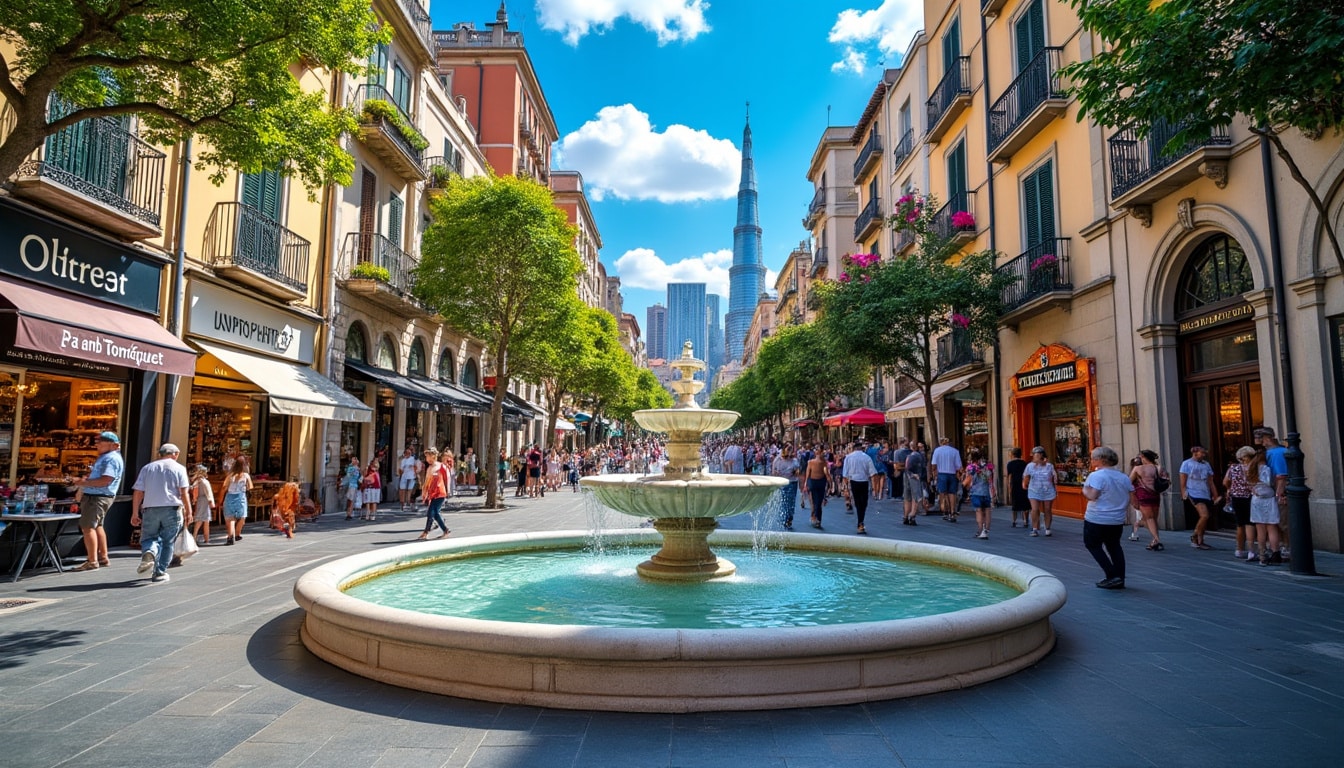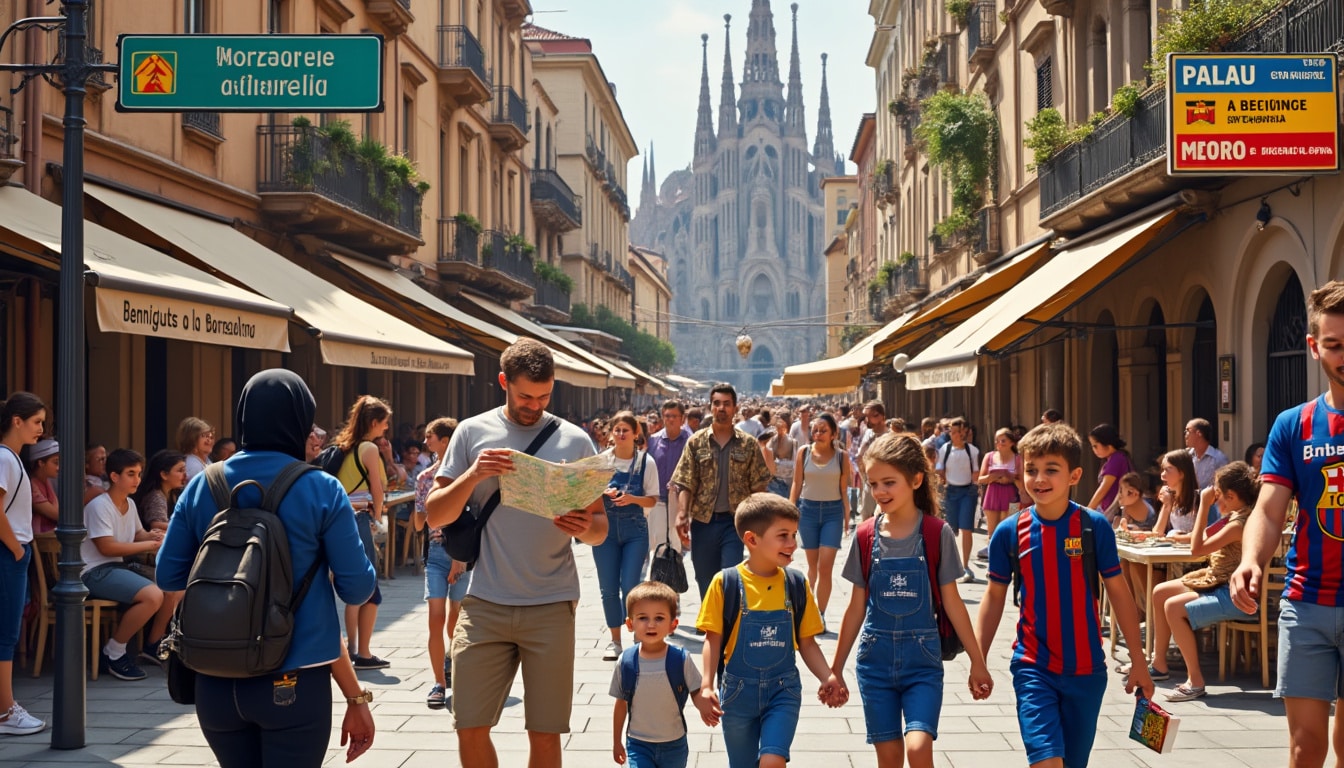Barcelona, renowned for its vibrant culture and architectural splendor, serves as a linguistic melting pot where a multitude of languages converge. At the heart of Catalonia, Barcelona harmoniously balances its dual official languages while embracing an array of global tongues due to its diverse population. This linguistic tapestry not only enriches the city’s cultural fabric but also provides a unique perspective on the dynamic interplay between language, identity, and globalization. Delve into this fascinating world of languages in Barcelona and explore how this multilingual landscape shapes the daily lives of its inhabitants and visitors alike.
The Official Languages of Barcelona: Catalan and Spanish
In Barcelona, the stage is set for a fascinating linguistic dynamic as both Catalan and Spanish firmly hold the title of official languages. Catalonia, renowned for its cultural and political autonomy, has long championed Catalan as a cornerstone of its identity. Catalan, a Romance language originating in the 8th and 9th centuries, stands distinct from Spanish, sharing closer linguistic ties with languages like French and Italian. The richness of Catalan history is encapsulated in its survival and revival, having been suppressed during the Franco regime from 1939 to 1975.
Today, Catalan is not merely a matter of regional pride; it is a language deeply ingrained in the societal framework. From school curricula to official government documentation, Catalan maintains a prominent presence. Catalan-speaking media outlets, such as daily newspapers and television channels, underscore its vital role in everyday communication.
Spanish, or Castilian, complements Catalan, serving as Spain’s national language. In Barcelona, a city teeming with diversity, almost everyone is bilingual, effortlessly switching between Catalan and Spanish based on context. This bilingualism is mirrored in public signage, cultural events, and educational institutions. While Catalan often assumes precedence in local settings, Spanish enjoys universal comprehension, facilitating communication across Spain’s varied regions.

To illustrate the prevalence of both languages, consider the influence of social interactions in settings like markets, cafes, and public transport where the native Barcelona tongues intermingle seamlessly. Indeed, speaking even a few phrases in Catalan is appreciated by locals as an acknowledgment of their culture and heritage.
In summary, the coexistence of Catalan and Spanish in Barcelona epitomizes a successful model of bilingualism, reflecting a historical path of resilience and cultural synthesis. The dual presence of these languages lays a foundation for a globally connected community while preserving the cultural wealth inherent to Catalonia.
Barcelona’s International Linguistic Scene
Barcelona’s linguistic diversity extends beyond its official languages, featuring a thriving international scene influenced by immigration and tourism. Over 300 languages are reportedly spoken across the cityscape, mirroring Barcelona’s status as a cosmopolitan hub.
English emerges prominently, being the unofficial third language of international communication. Especially in tourist-heavy areas such as La Rambla and the Gothic Quarter, English proficiency is commonplace among residents and service industry employees. English-language schools and cultural events enrich the city’s educational and social offerings.
A plethora of other languages contribute to the rich tapestry of Barcelona’s linguistic landscape. French is spoken by many, particularly older generations, due to historical ties and regional similarities. Similarly, Italian has a presence, facilitated by Mediterranean connections and cultural exchanges. Notably, the influx of immigrants has led to an increase in languages like Arabic, Chinese, and Russian. Each of these communities brings unique cultural flavors and linguistic traditions, contributing to Barcelona’s multicultural identity.
Here’s a brief overview of languages commonly encountered in Barcelona, apart from the official ones:
- 🌍 English – Widely understood, especially in tourism.
- 🇫🇷 French – Historically adjacent, offering mutual intelligibility with Catalan.
- 🇮🇹 Italian – Shared linguistic roots enhance comprehension.
- 🇩🇪 German – Influential due to economic ties and travel.
- 🇵🇹 Portuguese – Similar language group as Spanish, fostering ease of communication.
- 🌐 Arabic, Chinese, and Russian – Represent significant immigrant populations.
As a microcosm of global languages, Barcelona offers a unique learning environment enriched by diversity. Language schools cater to diverse linguistic needs, offering programs in Spanish, Catalan, and other global tongues. The city’s commitment to language learning is evident in programs encouraging multilingualism among youth, reflecting future-ready education strategies.
In essence, the multilingual ambiance of Barcelona not only attracts but embraces global influences, reflecting a city that thrives on cultural hybridity and international nexuses.
Learning Catalan and Spanish in Barcelona
Barcelona presents an unparalleled environment for language acquisition, offering immersion in both Catalan and Spanish. For those interested in taking this linguistic journey, several opportunities exist to learn and practice these languages amidst a vibrant cultural context.
Catalan, given its significance in Catalonia, poses a compelling choice for language learners seeking to engage deeply with local culture. As Catalan is deeply embedded in the region’s social fabric, non-native speakers can access numerous resources to aid their learning. Public libraries, cultural centers, and universities offer language courses, often subsidized to encourage broader participation. Even government websites provide online materials, emphasizing Catalan’s accessibility.
Spanish, too, attracts a global audience as an internationally spoken language. Barcelona houses many reputable language schools offering courses in Spanish, tailored to various proficiency levels. These educational institutions often provide immersive experiences such as cultural tours and conversational exchanges, enhancing language skills through practical, real-world applications.
Consider this strategy for learning languages in Barcelona:
- 🏫 Enroll in language schools or university courses focusing on either Catalan or Spanish.
- 🎭 Participate in local cultural events and activities to practice language skills naturally.
- 📚 Utilize library resources for access to language texts and multimedia.
- 🗒 Join local language exchange groups or tandem language partners.
- 🏡 Opt for homestay accommodations to enhance language immersion.
Barcelona’s thriving expatriate community also provides a platform for exchanging languages, further broadening linguistic exposure. This dynamic encourages a deeper understanding of linguistic nuances and fosters meaningful cultural exchanges.
Ultimately, learning Catalan or Spanish in Barcelona extends beyond language mechanics; it involves immersing oneself in the rhythms of Catalonian life, tapping into the rich cultural narratives that shape this vibrant city.
The Influence of Linguistic Diversity on Barcelona’s Business Landscape
Barcelona’s linguistic diversity extends its influence into the business realm, positioning the city as a thriving hub for international commerce and innovation. The confluence of multiple languages creates a fertile ground for cross-cultural business interactions, enabling companies to tap into diverse markets and customer bases.
In Barcelona, business communications often navigate between Catalan and Spanish, with English emerging as the lingua franca in international dealings. Multilingualism is a valuable asset for professionals operating in sectors such as tourism, technology, and trade, where diverse linguistic skills are highly prized.
Consider these effects of linguistic diversity in the Barcelona business environment:
- 🗣 Enhanced cross-cultural communication, fostering collaboration and innovation.
- 🌐 Expanded market reach, allowing businesses to engage with global audiences.
- 🏢 Attraction of international talent, contributing to a rich professional ecosystem.
- 🔄 Increased language service sectors, including translation and localization.
- 📈 Boost in language-related industries, such as education and consultancy services.
Moreover, language skills elevate professional competencies in Barcelona, where being bilingual or multilingual is often seen not just as an advantage but as a requisite. Enterprises heavily invest in language training to align their workforce with global standards, emphasizing languages like English, French, and more region-specific ones like Arabic and Chinese.
These linguistic dynamics also influence marketing strategies, leading to campaigns that are linguistically and culturally attuned to diverse consumer segments. Therefore, the city’s multilingual makeup reinforces Barcelona’s role as a strategic gateway to Spanish-speaking markets and beyond.
In summary, Barcelona’s business landscape thrives through its linguistic diversity, facilitating a competitive edge in the global economy by integrating varied cultural insights into its corporate practices.
The Role of Language in Barcelona’s Cultural Identity
Language in Barcelona transcends mere communication; it is a powerful emblem of cultural identity and heritage. The interplay of Catalan and Spanish, alongside international languages, shapes a unique cultural expression embedded in the arts, traditions, and daily life of the city.
Catalan forms the bedrock of cultural expression, intricately linked to regional identity. It is the language of traditional music, literature, and festivals that echo Catalonia’s history and societal ethos. Iconic events such as La Mercè, the city’s annual festival, and Sant Jordi, Catalonia’s patron saint day, highlight the cultural significance of Catalan, where stories, poetry, and folklore come alive.
The arts scene in Barcelona mirrors this linguistic diversity. Theatre performances and film festivals often feature a mix of Catalan, Spanish, and foreign languages, offering a mosaic of perspectives and narratives. Additionally, museums and galleries curate exhibits that celebrate linguistic and cultural plurality, reflecting Barcelona’s open embrace of international influences.
The significance of languages in Barcelona’s cultural sphere includes:
- 🎨 Catalan as a medium for regional art forms and cultural preservation.
- 🎶 Multilingual musical landscapes showcasing local and international acts.
- 📖 Literary festivals that bridge cultural and linguistic boundaries.
- 🏛 Museum exhibits dedicated to linguistic and cultural diversity.
Language further serves as a gateway to understanding Barcelona’s dynamic and multifaceted character, where historical narratives and modern-day innovations intersect. It fosters community bonds and welcomes global visitors, encouraging cultural exchanges that enrich the collective consciousness.
In essence, language in Barcelona is a celebration of identity and an invitation to engage with the world, continuously molding and redefining what it means to be part of this vibrant city.
Frequently Asked Questions
Here are some commonly asked questions regarding the languages spoken in Barcelona:
- What is the primary language in Barcelona?
Both Catalan and Spanish are official languages, with Catalan often used in local settings. - Is English widely spoken in Barcelona?
Yes, especially in tourist areas and among younger populations, English is widely understood. - How can I learn Catalan before visiting Barcelona?
You can start with online resources, language apps, or local classes if available in your area. - Are Catalan and Spanish similar?
While both share Latin roots, they are distinct languages with different vocabulary and grammatical rules. - Do I need to know Catalan to live in Barcelona?
Knowing Catalan is beneficial for cultural integration, but Spanish suffices for everyday life.

